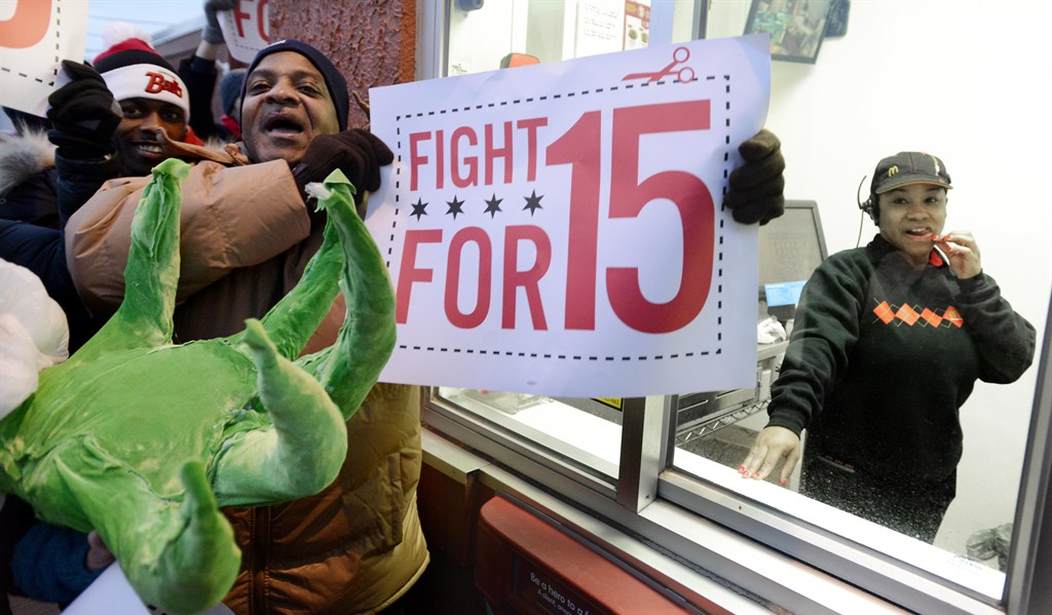If you’ve ever wondered how the United States got in to its current mess of a stagnant economy and out-of-control government, I have a suggestion. Take a good look at what a handful of voters in one of America’s finer suburbs did to themselves and the rest of their community, and realize that it is a microcosm for what’s happening all across the country.
The city in question is Seatac, a small suburb in the state of Washington (it’s name is derived from the larger neighboring cities of Seattle and Tacoma). Last year a group of activists there were frustrated with the preponderance of low paying entry-level service industry jobs, so they did what seemed only logical: they collected enough signatures on petitions to launch a ballot initiative that, if passed, would require a minimum wage of $15.00 per hour.
The city was soon flooded with cute campaign signs. Featuring the silhouetted image of a young child tossing a toy glider in to the air as the glider pointed upwards, the slogan read, “vote ‘YES’ for proposition 1 and watch our economy take off!”
Unionized workers at the Seattle Tacoma (frequently abbreviated “SEA-TAC”) International Airport and at nearby hotels and restaurants took to the streets urging passage of the initiative. And while the margin of victory was so slim that the election results weren’t certified until three weeks after Election Day, on November 26th proposition 1 was declared the law of land.
The Huffington Post called it “historic.” CNN Money said business owners had been “stung.” The true believers in big government declared it a harbinger of things to come, and celebrated the new wealth that would be theirs once the new wage requirement took hold on January 1 of 2014.
Recommended
But then suddenly the rule of law got in the way of the liberal progressive agenda. A court challenge quickly ensued and a county judge determined that, for a couple of very good reasons, the new minimum wage requirement wouldn’t apply to many of the workers who had campaigned for it.
For one, the employees at SEA-TAC airport wouldn’t see a wage increase because SEA-TAC airport is owned and operated by the city of Seattle. While the city of Seatac is adjacent to Seattle – and the name of the city of “Seatac” and the abbreviated name of the “SEA-TAC” airport are pronounced the same, the laws of the city of Seatac don’t have jurisdiction in the city of Seattle – so the passage of proposition 1 had no impact on the wages paid to Seattle city employees.
Secondly, the judge ruled that even within the city of Seatac the new minimum wage requirement wouldn’t apply to unionized workers. When members of a labor union agree to a labor contract with their employer, the terms of the contract are legally binding for both the workers and the employer. The government, so the judge ruled, has no right to arbitrarily impose a law that would change the terms of the contract that private parties (the workers and the employer) had already put in place. Thus unionized hotel and restaurant workers would continue to earn their less-than-$15.00 per hour wage for the duration of their union contract, despite all their tireless efforts to turn out the vote.
The frustration didn’t begin and end with unionized workers and airport staffers. Many non-unionized workers in the city of Seatac were disappointed to learn that the new law only applied to businesses of certain staffing sizes – smaller companies with few employees didn’t have to comply. Even so, small business owners in Seatac are still feeling the pain of workers resigning to take higher-paying jobs with bigger companies.
Interestingly, a tiny portion of the city’s population created the chaos that has engulfed all of Seatac. With a citywide population of 27, 667, less than fifty percent of the residents – 12, 108 – are registered voters. Among them, only 6, 003 people actually cared enough to vote, and Proposition 1 passed with only a 77 vote margin.
In an era where members of Congress vote on unread bills and the President signs them in to law, it stands to reason that workers, union leaders and private residents could pass a ballot initiative without understanding the most basic things about the initiative’s limitations, implications and jurisdictions. We live at a time when Americans are far more interested in sports scores and reports of Justin Bieber’s latest arrest, than they are interested in the inner-workings of their government and the economy, or even the history of their own country.
Such foolishness causes uncertainty for businesses, and uncertainty kills jobs. Until Americans care enough to start reading the fine print again, conditions aren’t likely to get much better.

























Join the conversation as a VIP Member